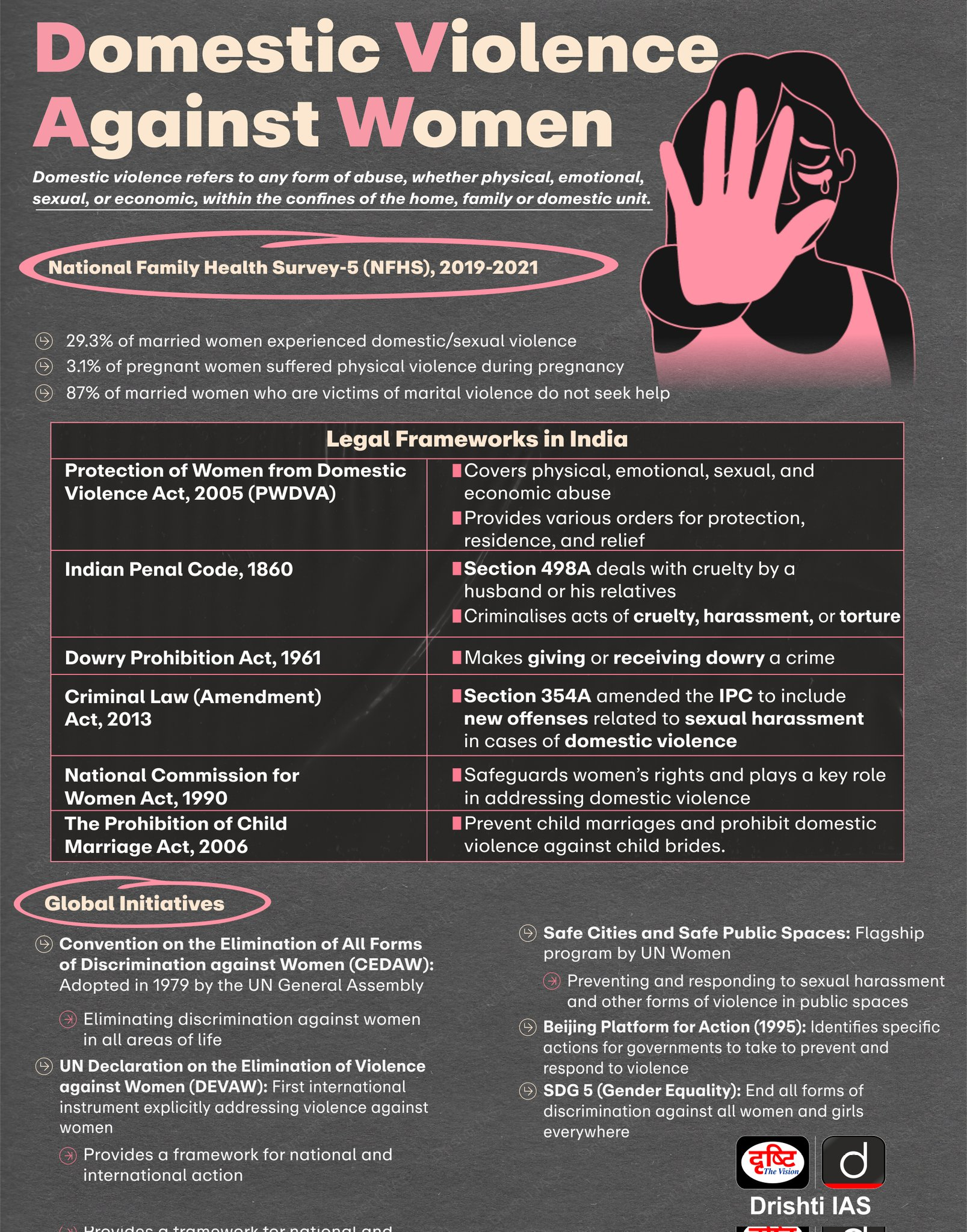Indian Polity
Police as Last Resort in Marital Dispute
- 21 May 2024
- 8 min read
For Prelims: Supreme Court, World Economic Forum's, Global Gender Gap Report 2023, Bhartiya Nyaya Sanhita, 2023, Dowry Prohibition Act 1961, Alternative Dispute Resolution (ADR)
For Mains: Police as a Last Resort in Domestic Disputes, Factors Contributing to Domestic Violence, Alternative Dispute Resolution (ADR)
Why in News?
Recently, the Supreme Court of India has advised caution to families facing marital trouble, stating that going to the police should be the “last resort”.
What are the Observations of the Supreme Court?
- About:
- A SC bench made some observations while ruling on a petition filed by the husband against the order of the Punjab and Haryana High Court which refused to quash criminal proceedings against him.
- The Supreme Court advises caution in using police intervention only in "very genuine cases of cruelty and harassment".
- Observations:
- The judgement cautions against the mechanical application of Section 498A (domestic cruelty) of the Indian Penal Code (IPC).
- A “complete" domestic violence case requires elements like criminal intimidation or causing hurt beyond trivial irritations.
- The court urges Parliament to review Sections 85 and 86 (up to 3 years) imprisonment of the Bhartiya Nyaya Sanhita, 2023 (similar to Section 498A IPC).
- Divorce is acknowledged as detrimental to a child's upbringing, especially when initiated hastily due to criminal proceedings.
- The judgement encourages High Courts to carefully consider all aspects and circumstances before deciding on pleas to quash criminal proceedings arising from marital issues.
Note:
- The Madhya Pradesh High Court ruled that unnatural sexual intercourse by a man with his wife will not be considered "rape" under Section 377 of IPC as the consent of the wife in such a case becomes immaterial because she was wedded to him.
- The court quashed an FIR registered by a wife against her husband, accusing him of having unnatural sex.
- Though marital rape is not an offence in IPC yet Kerala High Court in 2021 ruled that marital rape amounts to cruelty by husband to wife and a ground for divorce under the ambit of cruelty.
What are the Other Existing Ways to Resolve Matrimonial Disputes?
- Various mechanisms under the Alternative Dispute Resolution (ADR) can help in resolution of the matrimonial disputes speedily:
- Mediation: A neutral third party facilitates communication and negotiation between spouses to arrive at a mutually agreeable solution regarding matrimonial and family disputes.
- The Supreme Court in the K.Srinivas Rao vs D.A Deepa case emphasised mediation in matrimonial disputes.
- Conciliation: Similar to mediation, but the conciliator may also propose solutions and guide the couple towards an agreement.
- Arbitration: Here, a private arbitrator chosen by both parties hears arguments and delivers a binding decision on the dispute.
- Mediation: A neutral third party facilitates communication and negotiation between spouses to arrive at a mutually agreeable solution regarding matrimonial and family disputes.
- Also, various legal institutions provide for Alternative Dispute Resolution (ADR) as a more effective way to deliver justice due to the involvement of factors like emotions and social taboos in the marriage concept.
- Family Courts, established by the Family Courts Act, of 1984, promote conciliation and secure speedy settlement of disputes relating to marriage and family affairs and related matters.
- Gram Nyayalayas, established under the Gram Nyayalayas Act, 2008 provides for speedy and easy access to the matrimonial disputes in the rural areas of India.
- The Code of Civil Procedure, 1908 and the Hindu Marriage Act, 1955 also encourage reconciliation in family disputes.
Way forward
- Parliament should consider a review of Sections 85 and 86 of Bhartiya Nyaya Sanhita to prevent its further misuse or fake cases.
- The major focus should be towards the efforts of reconciliation before legal action to minimise police intervention in cases related to matrimonial disputes.
- There is a need to strengthen ADR mechanisms by proper training of mediators and conciliators in handling sensitive marital issues.
- There is a need to regulate and reform local and unregulated ADR mechanisms, such as Khap Panchayats (caste or community groups), which act as quasi-judicial bodies and pronounce harsh punishments based on age-old customs, even in sensitive marital issues.
- Focus should be given towards public awareness about legal rights and ADR options for peaceful dispute resolution.
- Proper mechanisms should be set up to provide accessible mental health services to couples facing marital discord, promoting communication and conflict resolution skills.
Conclusion
The Supreme Court's observation focuses on a nuanced approach to marital disputes. It encourages couples to prioritise reconciliation and tolerance over immediate police intervention or criminal proceedings. While acknowledging genuine cases of cruelty, the court aims to prevent the misuse of laws and safeguard the well-being of both spouses and children.
|
Drishti Mains Question: Q. Discuss the Supreme Court's observations on the involvement of police in matrimonial matters. Also, mention other existing ways to resolve matrimonial disputes in India. |
UPSC Civil Services Exam Previous Year Questions (PYQ)
Prelims:
Q. ‘Beijing Declaration and Platform for Action’, often seen in the news, is (2015)
(a) a strategy to tackle the regional terrorism, an outcome of a meeting of the Shanghai Cooperation Organization
(b) a plan of action for sustainable economic growth in the Asia-Pacific Region, an outcome of the deliberations of the Asia-Pacific Economic Forum
(c) an agenda for women’s empowerment, an outcome of a World Conference convened by the United Nations
(d) a strategy to combat wildlife trafficking, a declaration of the East Asia Summit
Ans: (c)
Mains:
Q. We are witnessing increasing instances of sexual violence against women in the country. Despite existing legal provisions against it, the number of such incidences is on the rise. Suggest some innovative measures to tackle this menace. (2014)
Q. How does patriarchy impact the position of middle-class working women in India? (2014)





